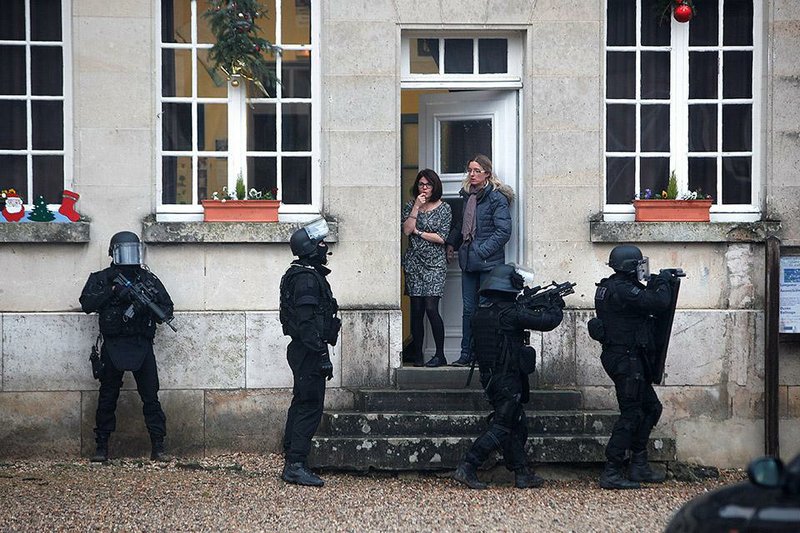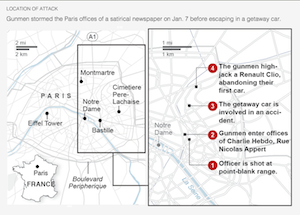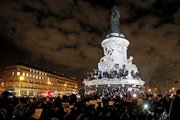PARIS -- Security forces backed by helicopters tracked two heavily armed brothers suspected in a massacre at a satirical French newspaper, homing in Thursday on a region north of Paris, as the nation mourned the dozen killed in the attack.
RELATED ARTICLES
http://www.arkansas…">One brother fired up by radicalism as other kept low profilehttp://www.arkansas…">French police corner shooting suspects, who take hostage
Authorities said they feared a second strike by the suspects, and police distributed their pictures with the notice "armed and dangerous." More than 88,000 security forces were deployed on the streets of France to protect key sites, including railway and subway stations, department stores and journalism offices.
France's maximum terror alert also was extended from Paris to the northern Picardie region, the location of several towns that authorities said are possible safe havens for the two suspects -- Cherif Kouachi, 32, and Said Kouachi, 34.
Both men were already known to authorities and had been placed on the U.S. no-fly list, a senior U.S. counterterrorism official said Thursday. Another U.S. official said the elder Kouachi had traveled to Yemen, although it was unclear whether he was there to work with extremist groups like al-Qaida in the Arabian Peninsula, which is based there.
Witnesses said the attackers claimed allegiance to al-Qaida in Yemen during Wednesday's attack.
A third suspect, Mourad Hamyd, 18, surrendered at a police station Wednesday evening after hearing his name linked to the attacks. His relationship to the Kouachi brothers was unclear.
The massacre, called the worst terrorist attack in France in more than a half-century, stunned the nation. National television ran constant live coverage of the manhunt. The lights of the Eiffel Tower went out Thursday night in a tribute to the dead. At noon, the Paris Metro came to a standstill and a crowd fell silent near Notre Dame Cathedral.
French President Francois Hollande -- joined by residents, tourists and Muslim leaders -- called for tolerance after the country's worst terrorist attack in decades.
"France has been struck directly in the heart of its capital, in a place where the spirit of liberty -- and thus of resistance -- breathed freely," Hollande said.
Nine associates of the brothers have been detained for questioning in several regions. In all, 90 people, many of them witnesses to the grisly assault on the satirical weekly Charlie Hebdo, were questioned for information on the attackers, Interior Minister Bernard Cazeneuve said in a statement.
The minister confirmed reports that the men were identified by an ID left in an abandoned getaway car, a slip that contrasted with the seeming professionalism of the attack.
Eight journalists, two police officers, a maintenance worker and a visitor were killed in the attack, and 11 people were wounded, four of them critically. The publication had long drawn threats for its depictions of Islam, although it also satirized other religions and political figures.
Charlie Hebdo previously had caricatured the Prophet Muhammad, and a caricature of the leader of the Islamic State extremist group was the last tweet sent out by the newspaper, minutes before the attack. Its Twitter feed has since gone silent.
Charlie Hebdo planned a special edition next week, to be published from the offices of another paper. Rather than print the usual 60,000 copies, it plans to print 1 million.
"The paper will continue, because they haven't won," Patrick Pelloux, a Charlie Hebdo columnist said, referring to the attackers.
Editor Stephane Charbonnier, known as Charb, who was among those slain, "symbolized secularism ... the combat against fundamentalism," his companion, Jeannette Bougrab, said on BFM-TV.
"He was ready to die for his ideas," she said.
Witnesses to the massacre have said the attackers claimed allegiance to al-Qaida. On videos they were heard saying they were avenging the Prophet. One witness, Cedric Le Bechec, wrote on Facebook that the attackers yelled, "Tell the media that it's al-Qaida in Yemen," as they were fleeing.
Jarring France further, two mosques in France were firebombed, and a police officer was killed in Montrouge, on the southern edge of Paris. Cazeneuve said that "at this stage" there was no known link between the killing and Wednesday's attack on Charlie Hebdo.
Police on Thursday searched an apartment in Reims, in the Champagne region, where the interior minister said Said Kouachi lived, with technicians gathering samples.
The hunt moved farther north after a report that two men resembling the suspects robbed a gas station in Villers-Cotterets early Thursday. The focus then enlarged to Crepy-en-Valois, where heavily armed security forces with air cover and a giant, black rapid-intervention truck moved through rural streets and among old stone buildings.
One French police official, speaking on condition of anonymity because the investigation was ongoing, said the suspects were linked to a Yemeni terrorist network.
The governor of a southern province in Yemen said Thursday that four French citizens had been deported from Yemen in the past four months. Gov. Ahmed Abdullah al-Majidi said he didn't have their names and there was no confirmed link between those deportations and the Charlie Hebdo attack.
Authorities around Europe have warned of the threat posed by the return of Western jihadists trained in warfare. France counts at least 1,200 citizens in the war zone, headed there, returned or dead. Both the Islamic State and al-Qaida have issued threats to France -- home to western Europe's largest Muslim population.
France is taking part in airstrikes in Iraq in a bid to defeat the Islamic State, and it also intervened to rout al-Qaida extremists from northern Mali, a former French colony.
The French suspect in a deadly 2014 attack on a Jewish museum in Belgium had returned from fighting with extremists in Syria; and the man who rampaged in southern France in 2012, killing three soldiers and four people at a Jewish school in Toulouse, received paramilitary training in Pakistan.
A debate on immigration, already a central and emotive issue in France and across Europe, was expected to escalate after such attacks, which underlined the sometimes clash between Western values and religious extremism.
In a sign of how the attack was already spilling over into French political debates, Marine Le Pen, leader of the far-right National Front, on Thursday called for a national referendum on whether to reinstitute the death penalty.
"The Islamists have declared war against France," she told the France 2 television station.
Le Pen also said she had not been invited to a "unity rally" set for Sunday, to which other political leaders have been invited.
"Things are clear from now on, the masks fall off," she told Le Monde newspaper. "National unity is a pathetic political maneuver."
But a certain amount of unity could be seen at noon Thursday, a national day of mourning, as bells rang, schools stopped classes and corporate boardrooms truncated meetings. At mosques, people bowed their heads. Some electronic road signs displayed the words, "Je suis Charlie," or "I am Charlie," in support of the newspaper.
At Notre Dame Cathedral, pedestrians wept as dozens stood silent on a gray and rainy day to pay tribute to the victims. Dozens lay flowers in front of Charlie Hebdo's headquarters. Through the vigils and tributes, some held pencils, a symbol of support for free speech and freedom of expression.
The night before, 100,000 people or more gathered all over France to show defiance and mourn those slain in the massacre.
And many Muslim clerics and spokesmen added their voices to the sense of outrage, decrying the killings as antithetical to legitimate Islam.
Abdennour Bidar, a French Muslim and professor of philosophy, said on Arte television that the killers "do not deserve the name of Muslims."
In the name of Islam, he said, he would not allow Islam to be "instrumentalized, stolen by these people who say that they are avenging the Prophet. It's a disgrace, an infamy, a lie."
Information for this article was contributed by Elaine Ganley, Jamey Keaten, Sylvie Corbet, Ahmed Al-Haj, Chris van den Hond and Michel Spingler of The Associated Press and by Steven Erlanger, Dan Bilefsky and Maia de la Baume of The New York Times.
A Section on 01/09/2015



